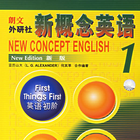
NCE1-L133L134
介绍: NCE1-Lesson 133 & Lesson 134
Part I New words and expressions 生词和短语
Lesson 133 Lesson 134
1 reporter [ri'pɔ:tə] n.记者
2 sensational [sen'seiʃənəl]a.爆炸性的,耸人听闻的
3 mink coat ['miŋk-kəut] 貂皮大衣
1)reporter n.
report v. a. 汇报,报告 b. 报道,记录 n. 报告,汇报 make a report
reporter n. 报...
介绍: NCE1-Lesson 133 & Lesson 134
Part I New words and expressions 生词和短语
Lesson 133 Lesson 134
1 reporter [ri'pɔ:tə] n.记者
2 sensational [sen'seiʃənəl]a.爆炸性的,耸人听闻的
3 mink coat ['miŋk-kəut] 貂皮大衣
1)reporter n.
report v. a. 汇报,报告 b. 报道,记录 n. 报告,汇报 make a report
reporter n. 报告人,汇报人,记者,记录者 a sports reporter
2)sensational adj.
sensation n .感觉,知觉
sensational adj. 轰动的,耸人听闻的
a sensational news report 耸人听闻的新闻报道
a sensational victory 巨大的胜利
sense n. 感官,功能
the sense of sight ( hearing, smell, taste, touch ) = the five senses
the sixth sense 第六感,直觉 senseless 无知觉的
Part II Passage 文章
Lesson133 Sensational news
Reporter: Have you just made a new film, Miss Marsh?
Miss Marsh: Yes, I have.
Reporter: Are you going to make another?
Miss Marsh: No, I’m not. I’m going to retire. I feel very tired.
I don't want to make another film for a long time.
Kate: let’s buy a newspaper, Liz.
Listen to this!
“ Karen Marsh: Sensational News!(轰动新闻) By our reporter, Alan Jones. Miss Karen Marsh arrived at London Airport today. She was wearing a blue dress and a mink coat. She told me she had just made a new film. She said she was not going to make another. She said she was going to retire. She told reporters she felt very tired and didn’t want to make another film for a long time.”
Millie: Well, fancy that, Kate!
Part III Key structures关键句型
间接引语
1.间接引语的概念
由本人说出的话带引号的为直接引语,而由自己或者别人转述的话,为间接引语
eg. He says, ‘He is going to leave.’ He says that he is going to leave.
2.直接引语变间接引语和间接引语变直接引语
He is my boyfriend. I want to go to England next week. They will go to America next year.
They say — He says —
3.间接引语与直接引语的过去式转换方式
如果在直接引语说话时是过去时(They said / I said / He said )后面的时态则需要变为相应的过去时态:
(即在引语中原有的时态上加一个过去)
一般现在时要变成一般过去时:
eg. I said, ‘I am eight.’ - I said that I was eight.
现在进行时要变成过去进行时:
eg. I said, ‘I am reading now.’ - I said that I was reading then.
现在完成时要变成过去完成时:
eg. I said, ‘I have just had lunch.’– I said that I had just had lunch.
现在完成进行时变过去完成进行时:
eg. I said,‘I have been reading since 9 this morning.’
I said that I had been reading since 9 that morning.
一般将来时要变为过去将来时:
eg. I said, ‘I will go to Beijing tomorrow.’
I said that I would go to Beijing tomorrow.
一般过去时要变成过去完成时:
eg. I said, ‘I was a soldier in 1788.’– I said I had been a soldier in 1788.
更多精彩尽请关注微信fhzxyy666

